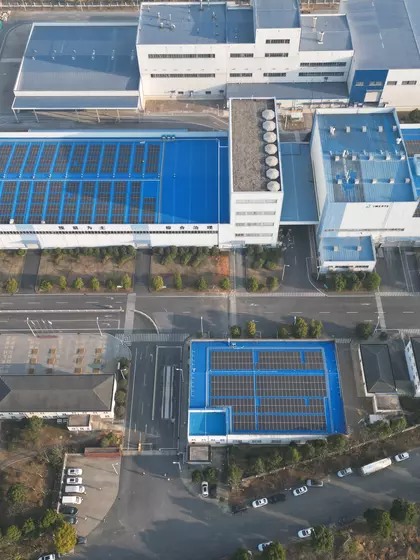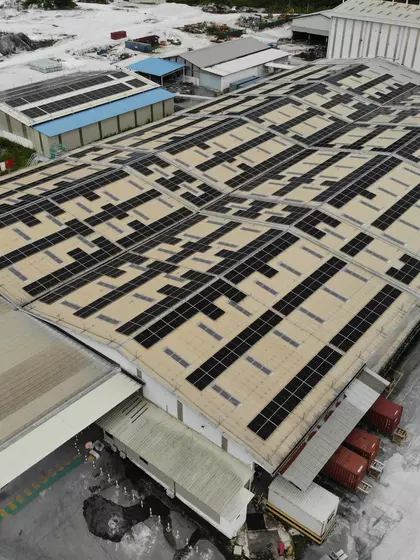Imerys signs major renewable Power Purchase Agreement with Akuo to supply 30% of its U.S. electricity needs and reduce carbon footprint
Imerys has signed an important 15-year Corporate Power Purchase Agreement (CPPA) with French renewable energy provider, Akuo, to source approximately 30% of its electricity needs in the U.S. from renewable sources. This strategic partnership involves the construction by Akuo of a 153 GWh solar park in Texas and marks a key milestone in Imerys’ journey to decarbonize its activities, in accordance with the trajectory of limiting global warming to 1.5°C.

The solar park built by Akuo will be located in Coke County, Texas. It is expected to begin operations in April 2026. Once up and running, it will supply approximately a third of the electricity needs of Imerys’ U.S. operations, cutting their GHG emissions by an estimated 67 kt of CO2e annually (vs. 2021 baseline), and contributing to a 3% reduction in Imerys’ Group-wide emissions. Beyond its environmental benefits, the project will also create added value for Coke County, supporting local economic development and contributing to the growing renewable energy sector in Texas. The project is designed to qualify for domestic content rules, thanks in particular to its supply of solar panels and other American equipment.
Accelerating the energy transition through corporate Power Purchase Agreements
The PPA agreement with Akuo – a global, independent renewable energy producer specializing in wind, solar, and energy storage projects – sits within the scope of Imerys’ Global Power Purchase Agreement Program, launched in 2023. This program aims to meet the electricity needs of Imerys sites worldwide through both on-site and off-site renewable energy PPAs. It is an integral part of a broader plan to supply Imerys’ operations with 80% low-carbon electricity by 2030.
Renewable energy and PPAs are gamechangers for Imerys’ decarbonization strategy, representing 50% of the Group’s efforts to reduce emissions. By securing long-term agreements with renewable energy providers, such as Akuo, Imerys is not only reducing its reliance on fossil fuels, but also advancing its ambitious climate transition roadmap, which aims to cut Scope 1 and 2 emissions by 42% by 2030, compared to a 2021 baseline, limiting the global temperature rise to 1.5°C.

The climate crisis presents a pressing and far-reaching threat, with profound environmental and social consequences. Addressing it requires collective action from industries worldwide to accelerate the shift to a low-carbon economy, in line with the 1.5°C threshold set by the Paris Agreement. PPA agreements like the one we have just signed with Akuo are powerful tools for helping us achieve our ambitious emissions reduction target and to offer products and solutions with an improved environmental footprint that help our clients create sustainable value.
A growing commitment to renewable energy
The agreement is the first off-site contract for Imerys and the first of its kind on a nationwide scale. It builds on a decade-long commitment to expanding renewable energy use at its operations, incorporating solar, wind and hydroelectric power, and rounds out several existing projects already deployed, or in preparation, at Imerys facilities in the UK, Bahrain, Malaysia, China and the U.S.
Supporting customers’ decarbonization goals
By accelerating its transition to renewable energy, Imerys not only strengthens its own environmental performance, but it also helps its customers create sustainable value. As a key supplier, Imerys’ emissions are factored into its customers' Scope 3 emissions, making its decarbonization efforts a critical part of their own sustainability strategies. By offering mineral solutions with a reduced carbon footprint, Imerys actively supports its customers in meeting their own climate goals and advancing their transition to a low-carbon economy.
Imerys’ climate change roadmap
Imerys’ journey to identifying, mapping, assessing, and quantifying GHG emissions began back in the 2000s. The company started monitoring Scope 1 and 2 emissions in 2007 and set its first emissions reduction target in 2018, which was validated by the SBTi in 2019. In December 2022, it took a major step further, committing to reduce these emissions from 2,485 ktCO2e in 2021 to 1,442 ktCO2e in 2030 in line with the commitments to limit global temperature rise to 1.5°C, and gaining SBTi approval in 2023.
Scope 3 monitoring began in 2018, initially focusing on estimated emissions from purchasing and transportation. In 2023, monitoring was expanded to include downstream emissions from processing, use, and end-of-life of sold products, alongside the establishment of Imerys’ first Scope 3 emissions reduction target.
In 2024, Imerys earned a place on the CDP Corporate Climate A List, improving its score from B in 2023. This improved CDP rating demonstrates the Company’s dedication to transparent communication to stakeholders as well as to driving concrete decarbonization and sustainability initiatives across its operations and value chain.











